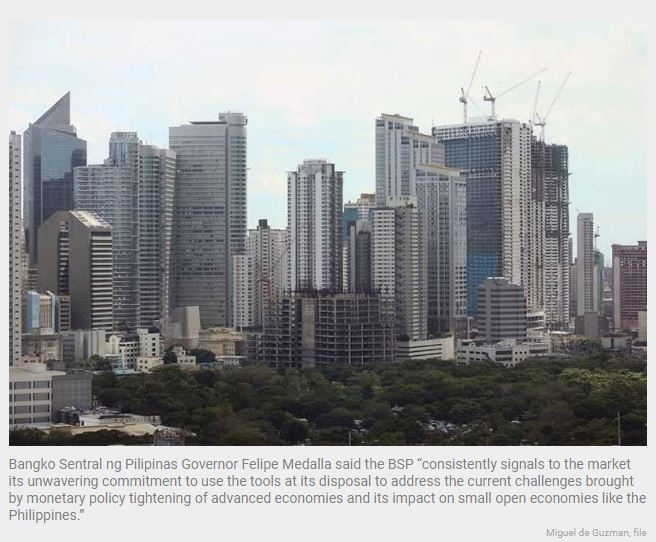Philippines ready to face challenges – BSP
MANILA, Philippines — The affirmation of the Philippines’ investment grade rating by Fitch Ratings reflects a credible economic policy framework, strong economic growth and sound external finances, according to economic managers.
Bangko Sentral ng Pilipinas Governor Felipe Medalla said the BSP “consistently signals to the market its unwavering commitment to use the tools at its disposal to address the current challenges brought by monetary policy tightening of advanced economies and its impact on small open economies like the Philippines.”
“This underscores the importance of having a credible central bank,” Medalla said.
The BSP’s policy toolkit includes interest rate adjustments, a flexible exchange rate and the use of foreign exchange reserves.
The central bank, Medalla explained, also supports the implementation by the national government of targeted non-monetary interventions to help address price pressures.
“The combination of these measures will help us manage exchange rate pressures and bring inflation back to a target-consistent path,” Medalla said.
Fitch also said the BSP’s inflation-targeting framework “remains credible” amid monetary tightening and domestic inflationary pressures.
Last week, Fitch affirmed the Philippines’ BBB rating, a notch above minimum investment grade, and negative outlook for the country.
The debt watcher sees the Philippine economy growing by 6.8 percent this year, driven by strong domestic demand, reflecting normalization of economic activity after the pandemic and the government’s investment program.
Fitch also expects the general government deficit to narrow to 4.3 percent of gross domestic product in 2022 and 2.4 percent of GDP by 2024 from 4.8 percent of GDP in 2021.
The direction of these estimates is aligned with the Marcos administration’s medium-term fiscal framework.
Finance Secretary Benjamin Diokno said the framework was formulated to guide the government’s financing program for the next six years.
Diokno also emphasized that the government economic team is employing the necessary policy levers to address emerging risks.
Fitch, meanwhile, maintained the outlook on the country’s BBB rating as negative, citing risks to the Philippines’ medium-term growth prospects, fiscal adjustment path, and external buffers in an environment of higher interest rates, weaker external demand and higher commodity prices.
The Philippines’ net external creditor position is likely to remain stronger than the BBB median, according to Fitch.
The rating agency expects the current account deficit to widen to five percent of gross domestic product in 2022, driven by higher commodity imports supported by strong domestic demand.
Fitch forecasts a narrowing of the shortfall to 1.8 percent of GDP by 2024.
According to the debt watcher, “the emergence of a current account deficit has put pressure on foreign exchange reserves, although we expect reserve coverage to remain ample at about six months of current external payments.”
As of end-September, the country’s gross international reserves (GIR) stood at $93 billion, representing a more than adequate external liquidity buffer equivalent to 7.4 months’ worth of imports of goods and payments services, exceeding the three months threshold set by the International Monetary Fund.
Moreover, the GIR is also about four to 6.6 times the country’s short-term external debt.
Source: https://www.philstar.com/business/2022/11/02/2220823/philippines-ready-face-challenges-bsp


 Thailand
Thailand




